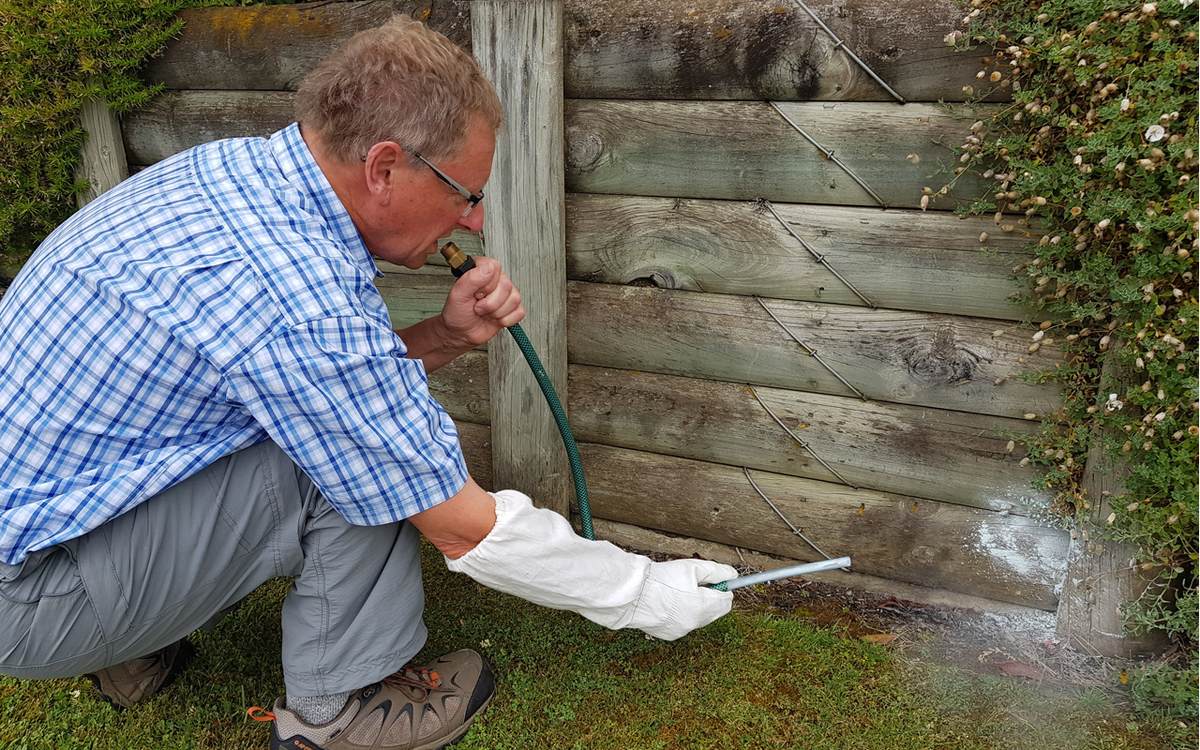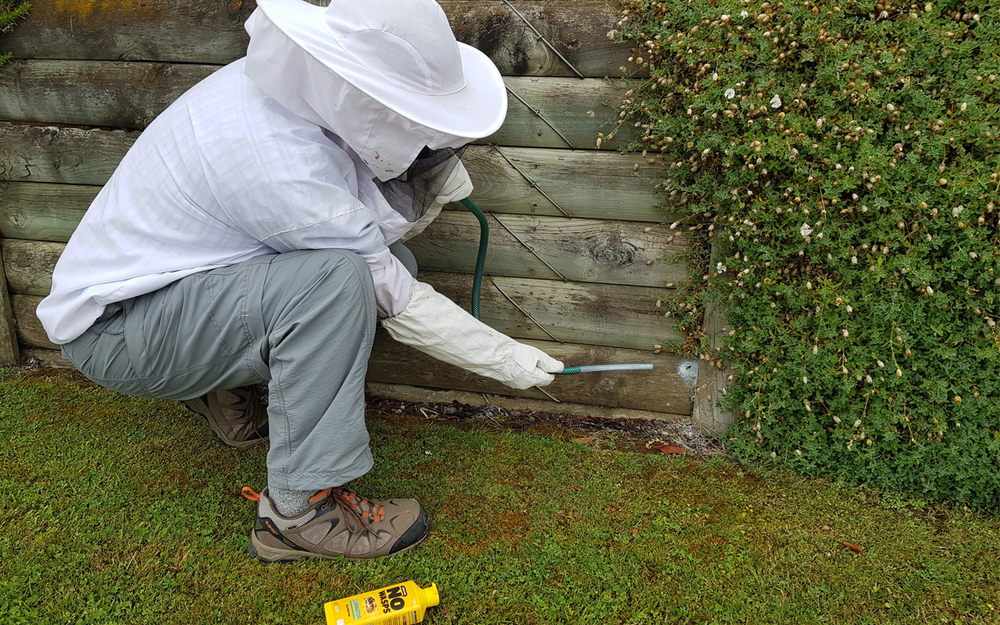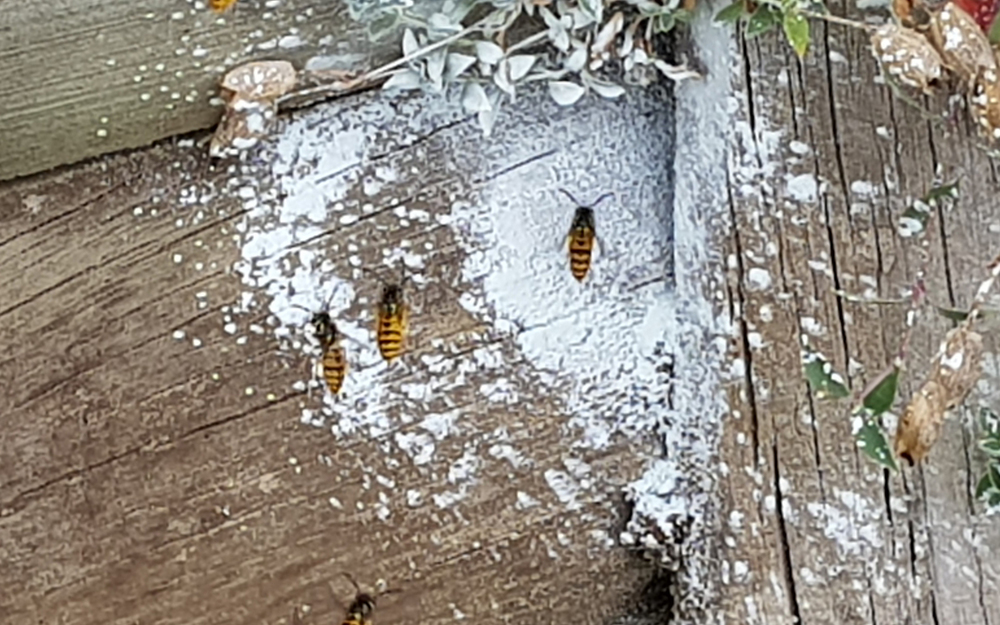Eco-warrior's war on wasps
Jan Ludemann
16 February 2021, 5:04 PM
 Chris Morison says wasps will change New Zealand ecosystems for the worse if not clamped down on. PHOTO: Jan Ludemann
Chris Morison says wasps will change New Zealand ecosystems for the worse if not clamped down on. PHOTO: Jan LudemannA serial wasp killer is on the loose in Te Anau in the guise of mild-mannered Chris Morison.
With a kill tally of more than a million wasps so far since December, the white-hooded crusader is on a vengeful campaign of working to eliminate as many of the nasty winged pests as he can find.
Before retirement Mr Morison, armed with a B.AGSC and Dip Environment Management, was employed by Environment South as a pest advisor and since his move to Te Anau about four years ago he has made it his mission to raise awareness of the danger of the introduced pests, not only the obvious danger to people from stings but also, he said, the bio-security risk to the natural environment in the way they compete with native fauna for the nectar and protein needed for colonies to survive and multiply.
Advertisement
Advertise on the Southland App
Mr Morison said he just doesn’t like the social, economic and environmental effects wreaked by the prolific German and common wasps.
He said the wasps will change New Zealand ecosystems for the worse and anecdotal evidence indicates they are slowly invading Fiordland unabated.
While Southland District Council has been very encouraging often contracting him to kill nests on council land, he is frustrated by the inaction displayed by the Department of Conservation (DOC).
“It’s simply not a priority in the Fiordland National Park”.
Nelson Lakes District was extremely proactive in getting on top o the wasp problem there, but the cooler climes of Fiordland meant wasps weren’t considered as important as stoats and rats, he said.
This was confirmed in a statement from DOC principal biodiversity ranger Tony Preston:
Fiordland National Park faces many risks to its unique environment and biodiversity within it. Currently, DOC’s priority for pest control within the park focuses on rats, possums and stoats as well as invasive weed control. Wasps are known to be present in the park, however due to the cooler temperatures, they don’t tend to reach the same levels as they do further north. If wasp nests are discovered in places where they could become an issue for public safety, such as a hut or toilet on public conservation land, DOC would investigate ways to remove it.
Advertisement
Advertise on the Southland App
Mr Morison said, wasps were adapting to the environment in much the same way that magpies have, and climatic change was also helping boost their numbers as well.
Nest are easily found “they fly in direct lines between food sources and their nest” and “they are easy enough to see especially when the sun is bright and low”.
Mr Morison is ‘tuned in’ to wasps and can spot them even when driving.
They can be found anywhere that is sheltered, dry and warm such as garden-waste, under paths, in house walls, ceilings and under floors. Empty Holiday homes particularly make ideal nesting places he said.
He kills them with Pyrethrin Powder which is safe in the environment compared with previously used toxic preparations such as Carbaryl now banned in many countries.

Right now, the wasps are feeding on nectar, but come March they will switch to a protein diet.
He is true volunteer happy to donate his time in what he considers an essential service to the community.
He depends on people letting him know if they have a wasp problem and, while he is not a professional in any sense of the word, he occasionally asks for a small payment to cover travel and product costs. But, more often than not, this is a free service especially when the nests are found on unoccupied land or houses.
Mr Morison encouraged people to check around their properties and if they found any of the unwanted pests to either kill the nest themselves or to get in touch with him by ringing him on 021 029 80524.


